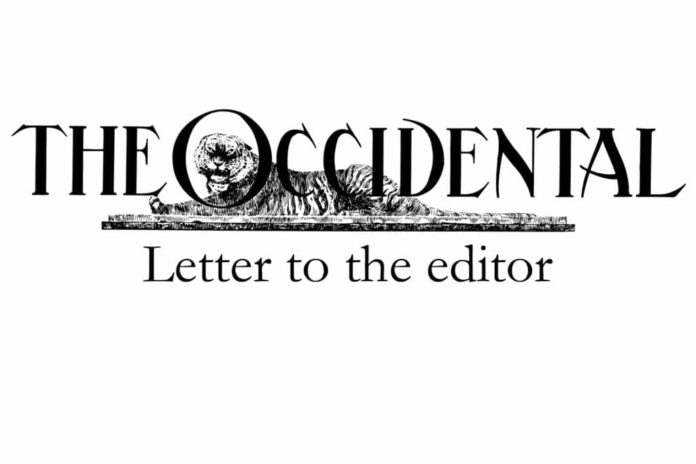Hello there. Perhaps the most challenging part of this letter is identifying its addressee — whether it is the Editor, the Reader, or the Community is, I admit, beyond me. Maybe it is all of you, maybe none. That being said, I am hardly steadfast about the content of the letter itself, not to mention the author. Then again, this uncertainty of directionality, of who is called and who is doing the calling, is to some extent the whole point. The question of who is foreign and who familiar is something that plagues the small community of Occidental College as much as it does any other.
For Occidental (having graduated a few months prior, I am now even hesitant to say “for us”), this challenge is perhaps more acute than for some. As you may be aware, and will be made painfully so should you not be, “[t]he mission of Occidental College is to provide a gifted and diverse group of students with a total educational experience of the highest quality — one that prepares them for leadership in an increasingly complex, interdependent and pluralistic world” (my italics).
This, of course, is boilerplate academic-corporate speak. Taken at face value, the core intention of this institution is to expand the circle of familiarity into the realm of the foreign. To be clear, however: I am not intending to mount a cynical, critical takedown of the Man, to reveal the Institution in all of its hypocrisy and bag on a few others just for good measure. Instead, I would ask you — yes, you, regardless of whether you are student, faculty, staff or passerby — to contemplate what to you, personally, is the familiar and the foreign.
Many foreign students (I’m told the polite phraseology is “international student,” although this makes us sound like we are imported goods to be picked up on a side aisle at Ralphs) I have had the pleasure of speaking who voiced ample discontent with their experiences in the States, and at Oxy in particular. A lot of commonplaces came up: complaints of the shallowness and facetiousness of daily interactions, a lack of historical or global awareness, and a general lack of generosity and warmth — all assembling to form a confusing maze of post-Puritanical customs. This is not news to many Americans. Most Americans I have met at Oxy find few greater delights than trashing their country — but that’s for another letter.
Quite a pickle we find ourselves in, with many moving parts. Overshadowing all is the institution of the college — an enterprise concerned with its survival. This is understandable, since it could not provide the education of thousands otherwise. More interesting are the dynamics on the ground, the myriad interminglings and interactions between all of you, all of us, nearly every second of the day. The question thus evolves: if it is not only for the institution to solve the problem of the alienation of students (and faculty, and staff), whose job is it?
While I cannot claim to have a perfect answer, I believe there is something to be said for recognizing the familiarity and foreignness in ourselves, as well as others. An endless seeking and identification of who is included and excluded at any moment will be just that — endless. It is a Sisyphean task of drawing continuously lines in the sand around ourselves and those standing right in front of us. Put with a banal simplicity I hope you can forgive, repetitively asking ourselves “am I in, or are you out?” misses the glaringly obvious — we are both here, with no place to lay our heads.
Since arriving in the United States, I spent many years in one kind of anguish or another about how I don’t belong here. I felt resentful towards Americans, as well as envious of them. I felt as though I had abandoned my homeland of Hungary, as I watched it slowly descend into an autocratic mafia state from sunny Southern California. I carried, and still do, a good amount of guilt over the relative ease with which I was able to attain my papers — it only took my family four years, while others it takes twice or thrice as long, and others still never get so lucky. None of what I have written about in this letter erases any of the problems, injustices and inequalities that my younger, and now slightly older, self rages against. This school, this city, this country and this world is a messed up place, with more unseemly and horrible things going on than we can wrap our heads around. And, not in spite but precisely because of that, I can’t help but think that we miss out on something essential when we fail to regard the person in front of us as more than an in- or out-group member. You are as foreign to me as I am to you, and just as familiar.
Mate Major
Occidental Class of 2022
![]()



































